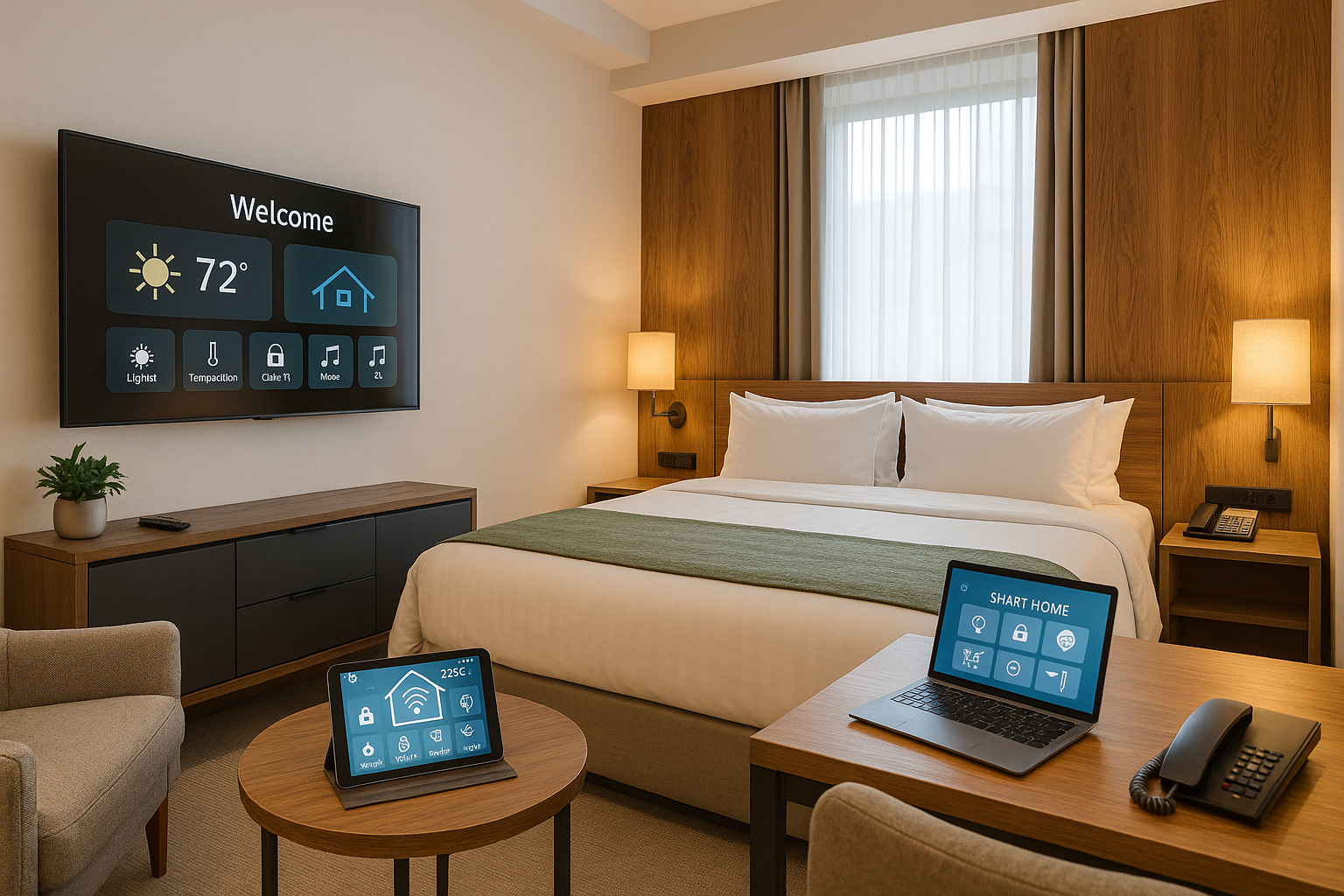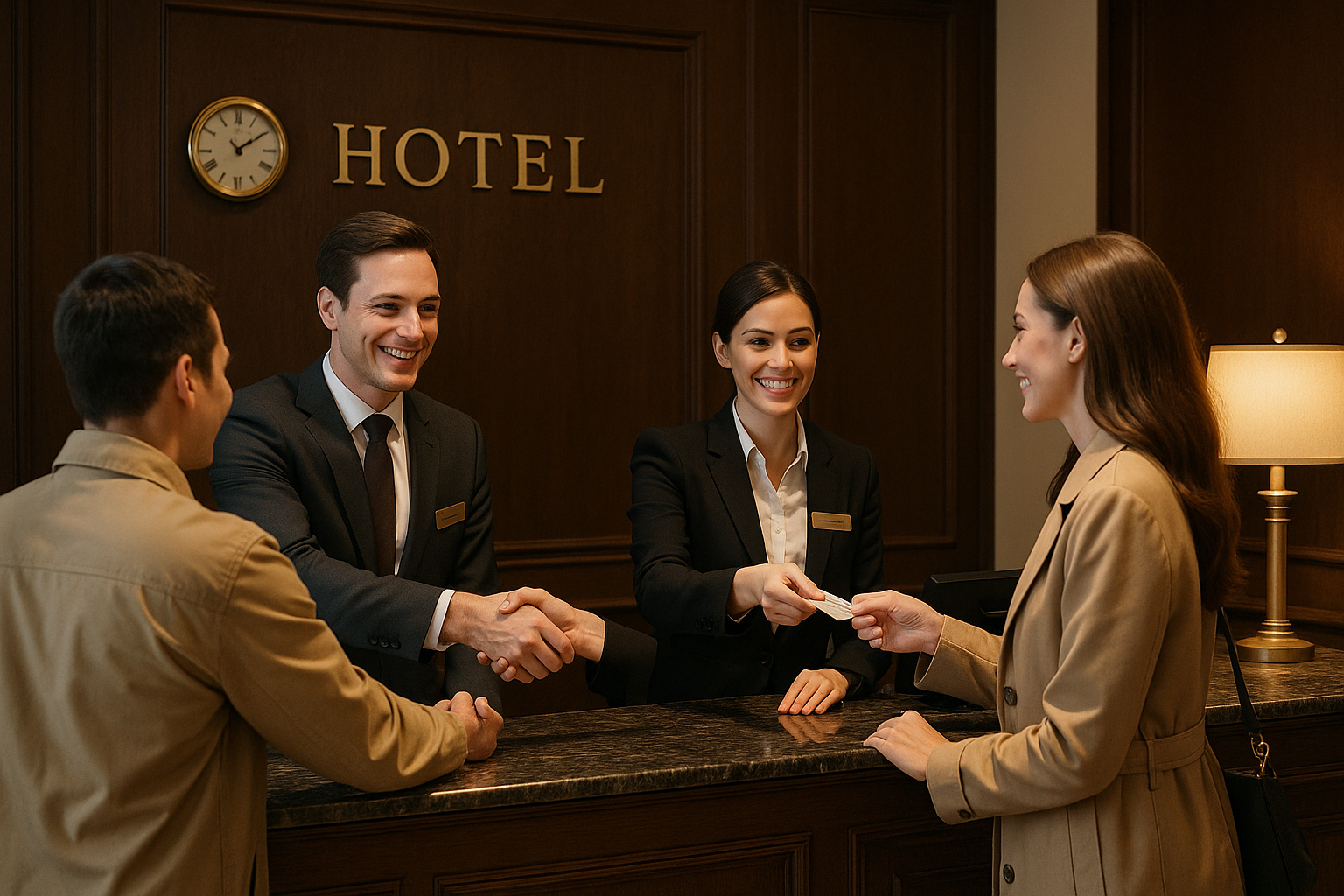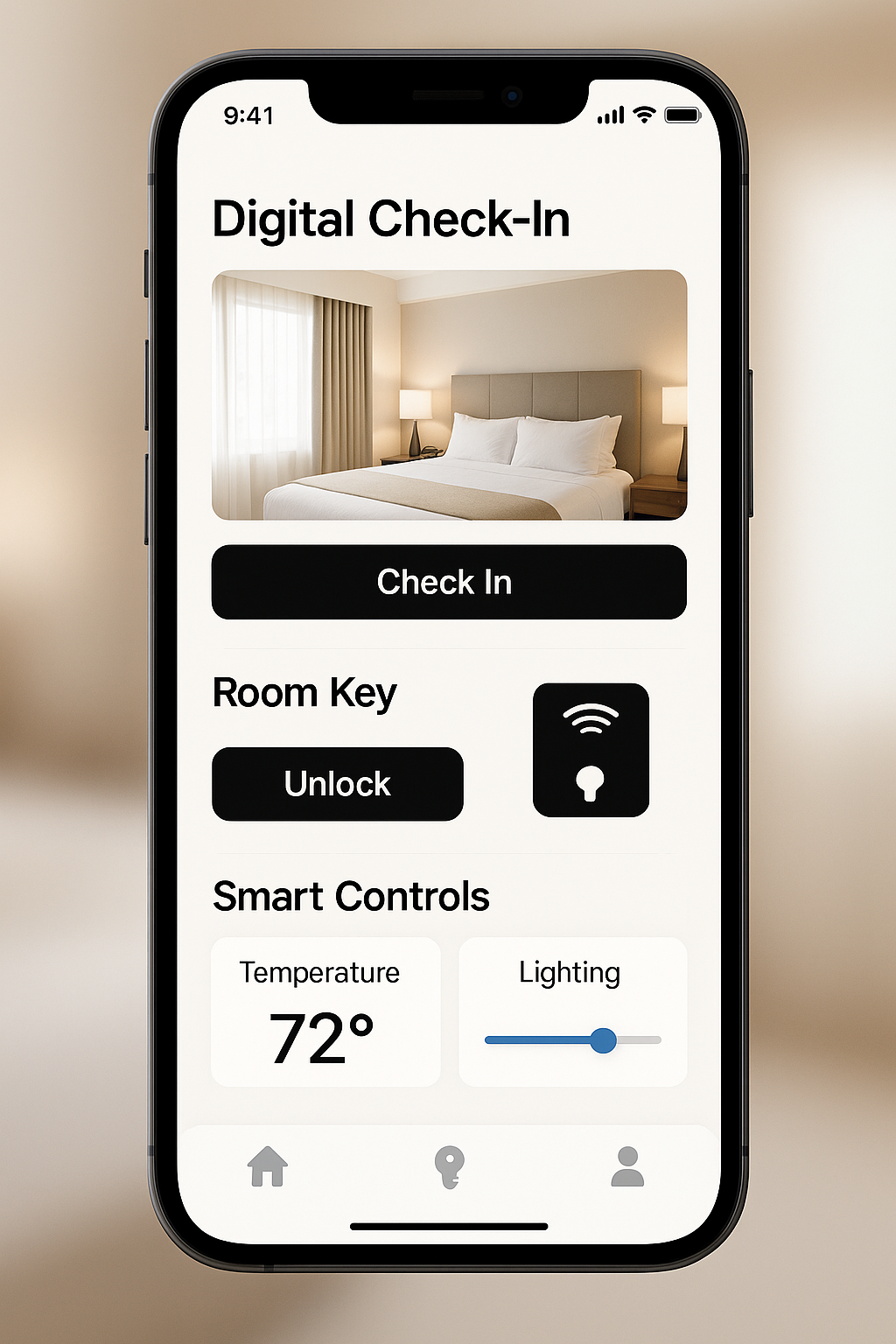

Close

The hospitality industry stands at a crossroads between technological innovation and time-honored personal service. With 80% of travelers willing to stay at hotels with completely automated front desks1 and 65% of hotel guests expected to prefer smart room features2, the debate between smart technology and traditional hospitality has never been more relevant. This comprehensive analysis explores what modern travelers truly want and how the industry is responding to these evolving preferences.
Smart hotels represent a fundamental shift in how guests interact with their accommodations. These properties leverage advanced technologies including the Internet of Things (IoT), artificial intelligence (AI), and automation to create seamless, personalized experiences3. The smart hospitality market, valued at $24.2 billion in 2024, is projected to grow at a remarkable 20.74% compound annual growth rate, reaching $75.3 billion by 20302.

Modern hotel room blending smart technology with traditional hospitality comfort
Recent surveys reveal specific technological amenities that travelers prioritize in their perfect hotel experience4:
Voice-activated assistants have emerged as particularly popular features, with properties like The Westin Buffalo and Marriott International successfully implementing Amazon Alexa systems that allow guests to control room settings, request services, and access information through simple voice commands5. These systems provide unprecedented convenience, enabling guests to adjust lighting, temperature, and entertainment without manual interaction.
Despite the technological revolution, traditional hospitality maintains significant appeal for many travelers. The essence of genuine hospitality lies in authentic care, attention to detail, and meaningful human connections6. This approach emphasizes personalized service delivered through face-to-face interactions, creating emotional bonds that technology struggles to replicate.

Traditional hotel front desk showcasing personal service and human interaction
Traditional hospitality excels in several critical areas that resonate with guests seeking authentic experiences7:
Research indicates that 69% of respondents list talking to a live agent by phone as one of their top three preferred forms of communication8, highlighting the continued importance of human interaction in customer service scenarios.
The preference divide between smart technology and traditional service often correlates with generational differences, though the gap is narrowing more than previously expected.
Younger travelers, particularly Gen Z, show the strongest preference for technological solutions. 82% of Gen Z travelers prefer using apps and kiosks for check-in9, significantly higher than other age groups. These digital natives value:
While older travelers haven’t rejected technology entirely, they demonstrate more measured adoption patterns10. Many appreciate technological conveniences but still value human interaction for complex requests or problem resolution. Research shows that guests with extensive histories in five-star accommodations are more likely to recognize and value technological improvements10 compared to newer guests who may view advanced features as standard rather than exceptional.
Leading hospitality brands are discovering that the most successful strategy involves thoughtfully combining smart technology with human-centered service rather than choosing one over the other.

Mobile hotel app displaying digital check-in and smart room controls
Smart hotels are implementing technology in ways that enhance rather than replace human interactions11:
Successful properties ensure that technology serves to amplify human capabilities rather than eliminate them. Staff training programs focus on leveraging technological insights to create more meaningful guest interactions, while face-to-face conversations during key moments like check-in and check-out reinforce personal connections11.
From an operational perspective, smart technology offers compelling advantages that directly impact both efficiency and guest experience.
Smart hotel systems deliver measurable operational improvements1213:
Research consistently demonstrates that well-implemented technology enhances rather than diminishes guest satisfaction1415:
Both smart and traditional approaches face distinct challenges that properties must address to succeed in today’s competitive landscape.
Technology-focused properties encounter several potential pitfalls1617:
Properties relying primarily on traditional approaches face their own constraints18:
Geographic and cultural factors significantly influence guest preferences for smart versus traditional hospitality approaches.
Markets like Japan and South Korea demonstrate the highest acceptance rates for hotel technology, with properties like the Henn-na Hotel in Nagasaki pioneering robot-staffed operations5. Cultural comfort with technology adoption creates opportunities for more aggressive smart hotel implementations.
European markets tend toward measured technology adoption that preserves cultural hospitality traditions while incorporating convenient digital features. Properties focus on enhancing rather than replacing traditional service elements.
American travelers show strong preferences for convenience-oriented technology, with 70% willing to skip traditional front desk interactions9 for mobile alternatives. However, they still value human interaction for complex situations and problem resolution.
The hospitality industry’s evolution suggests several emerging trends that will shape the smart versus traditional debate:
Biometric authentication, emotion AI, and augmented reality represent the next wave of hotel technology12. These innovations promise even greater personalization while potentially addressing some current limitations of smart hotel systems.
Environmental consciousness increasingly influences guest choices, with 53% of travelers seeking smart hotel solutions that blend comfort with eco-friendly features2. Smart technology’s energy efficiency advantages align with sustainability goals while traditional hospitality can emphasize local sourcing and authentic cultural experiences.
AI development continues advancing toward more natural, conversational interactions that may bridge the gap between technological efficiency and human warmth. Voice recognition technology and predictive analytics will become increasingly sophisticated in understanding and anticipating guest needs.
Based on current research and trends, hotels should consider the following strategies:
The evidence suggests that modern travelers don’t want to choose between smart technology and traditional hospitality—they want both. The most successful properties are those that thoughtfully integrate technological conveniences with authentic human connections, creating experiences that are both efficient and emotionally satisfying.
While younger demographics show stronger preferences for self-service technology, the majority of travelers across all age groups still value human interaction for complex needs and meaningful moments. The key lies in strategic implementation that uses technology to enhance rather than replace the personal touch that defines exceptional hospitality.
Hotels that master this balance—leveraging smart technology for convenience and operational efficiency while preserving the human elements that create emotional connections—will be best positioned to serve the diverse preferences of modern travelers. The future belongs not to exclusively smart or traditional properties, but to those that skillfully combine the best of both approaches to create truly memorable guest experiences.
As the industry continues evolving, properties must remain agile, continuously gathering guest feedback and adapting their technology-to-human service ratios based on their specific market demographics and brand positioning. The most successful hotels will be those that recognize that in hospitality, technology should amplify human capabilities rather than replace the genuine care and attention that have always been at the heart of exceptional service.
Plot No.LP-862, near Kiit Stadium, Prasanti Vihar, Patia, Bhubaneswar, Odisha 751024
Tel: +91 9114607080
livotelpremiumhotel@gmail.com